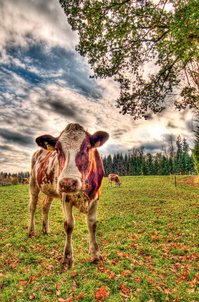In English it’s a throwaway phrase, a cussword—but for some people it’s literally true: shit is holy. For farmers in India, life begins in “that amazing gift from cows,” says physicist and food activist Vandana Shiva.
I don’t know how many of you are aware, the reason the cow is sacred in India is because of the shit.
Shiva smiles her warm and mischievous grin. She’s speaking in October 2006, exactly three years ago, to an audience at Emory’s Center for Ethics, in “Creating Food Democracy,” a lecture and video available from a link on her Wikipedia page. (Update: The video is no longer available; a report on the lecture is found here.) It’s the week of Diwali, the Hindu Festival of Lights, and her warm grin lights up the screen.
And one day after Diwali is a festival called Goberdhan Puja. “Gober” is cow dung, “dhan” is wealth, “puja” is prayer—a whole day dedicated to the worship of cow dung!
She may be interpreting the day a little more earthily than most Hindus—but for good reason: her lifework is about soil, food, and ecology.
I saw Vandana Shiva this week in person for the first time, and to the packed auditorium in Boulder she was equally radiant. Again with mischief in her smile she said,
You know, “organic farming” is traditional Indian agriculture.
Boulder gardeners chuckled appreciatively. They too are doing what farmers in India have done for centuries—replenishing their soil with dung and compost. Food cannot grow without shit.
But cow dung is a problem in the American system of industrial farming. When enormous numbers of cattle are kept together, their dung and urine become huge sources of pollution. If we needed any more evidence that factory farming is diabolical, we only need to see how in factory farming cow dung is pollution rather than gift. (Diabolical here = harming the ecosystem, including animals and humans.) Factory farms disregard the gift of shit—with disastrous results to water, soil, and air.
By contrast, permaculture and organic farmers are working as nature has done for millennia, growing food by using the whole cycle of life, including the manure. In The Omnivore’s Dilemma Michael Pollan talks about Polyface Farm in the Shenandoah Valley of Virginia, where the Salatin family produces from their 100 acres of pasture—in one growing season—35,000 dozen eggs and 35 tons of beef and pork.
How do they do it? The secret is the shit. They rotate six species of animals across the pasture. The animals perform cleanup services for one another. “One species’s manure becomes the next one’s lunch,” says Pollan. Cows graze for one day in a corner of the pasture, then they’re moved out. Three days later laying hens are moved in. Why wait three days? So maggots can develop in the cow dung. When the hens are moved in, they scramble among the cow patties to find their favorite protein treat—fresh maggots. Meanwhile, the chickens too are pooping, and their nitrogen-rich dung fertilizes the pasture some more. Fed by all this richness, the grass grows so fast that in four or five weeks the cycle can be repeated. Asks Pollan,
Can organic feed the world? Well, look how much food is produced on 100 acres.
The secret is symbiosis—allowing each species to feed the cycle of life. Which means allowing “waste” to do its job—become the integral part of the cycle that nature intends it to be.
“Waste” is priceless—to the cycle of life. Shit is holy.
This week the Hindu world again celebrated Diwali, the Festival of Lights. And one day after Diwali—October 18—was Goberdhan Puju.
So, a couple of days late, in honor of the complete cycle of life, Happy Holy Shit Day!
For more information:
On the place of cows in sustainable agriculture in India, see “Mad Cow vs. Sacred Cow” by Lincoln Kaye.
Watch Michael Pollan talk about Polyface Farm here (last 7 min of video).